英国文学家小故事
- 格式:docx
- 大小:18.01 KB
- 文档页数:6
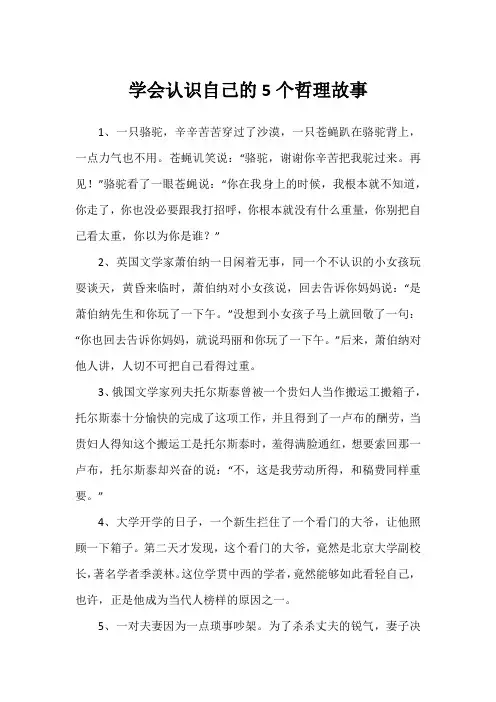
学会认识自己的5个哲理故事1、一只骆驼,辛辛苦苦穿过了沙漠,一只苍蝇趴在骆驼背上,一点力气也不用。
苍蝇讥笑说:“骆驼,谢谢你辛苦把我驼过来。
再见!”骆驼看了一眼苍蝇说:“你在我身上的时候,我根本就不知道,你走了,你也没必要跟我打招呼,你根本就没有什么重量,你别把自己看太重,你以为你是谁?”2、英国文学家萧伯纳一日闲着无事,同一个不认识的小女孩玩耍谈天,黄昏来临时,萧伯纳对小女孩说,回去告诉你妈妈说:“是萧伯纳先生和你玩了一下午。
”没想到小女孩子马上就回敬了一句:“你也回去告诉你妈妈,就说玛丽和你玩了一下午。
”后来,萧伯纳对他人讲,人切不可把自己看得过重。
3、俄国文学家列夫托尔斯泰曾被一个贵妇人当作搬运工搬箱子,托尔斯泰十分愉快的完成了这项工作,并且得到了一卢布的酬劳,当贵妇人得知这个搬运工是托尔斯泰时,羞得满脸通红,想要索回那一卢布,托尔斯泰却兴奋的说:“不,这是我劳动所得,和稿费同样重要。
”4、大学开学的日子,一个新生拦住了一个看门的大爷,让他照顾一下箱子。
第二天才发现,这个看门的大爷,竟然是北京大学副校长,著名学者季羡林。
这位学贯中西的学者,竟然能够如此看轻自己,也许,正是他成为当代人榜样的原因之一。
5、一对夫妻因为一点琐事吵架。
为了杀杀丈夫的锐气,妻子决定以离婚相要挟。
于是,一向霸道的她自拟离婚协议书,所有的一切财产归丈夫,孩子归丈夫,自己每月支付孩子五百元生活费,以示离婚的决心。
不依不饶的她本以为丈夫不会同意,未曾想到丈夫很爽快地同意了。
一周之后,妻子主动找丈夫要求复婚,被丈夫拒绝了。
她对他说:“给你半年时间,如果你还不同意复婚,那我就嫁人了!”她太高估了自己,以为丈夫会非她不娶呢!期待着眼前已经变得有点陌生的丈夫听到最后通牒能有所触动。
然而,丈夫脱口而出,“我早就受够你了,随你的便!”后来,他们也就真的没有复婚。
:千万不要把自己看得太重,一定要学会认识自己。
这个世界上,每个人都很重要,但是离了谁地球都照样地转。
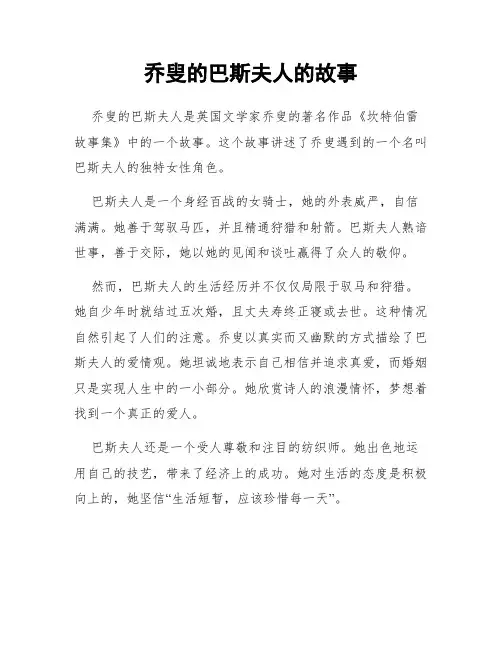
乔叟的巴斯夫人的故事
乔叟的巴斯夫人是英国文学家乔叟的著名作品《坎特伯雷故事集》中的一个故事。
这个故事讲述了乔叟遇到的一个名叫巴斯夫人的独特女性角色。
巴斯夫人是一个身经百战的女骑士,她的外表威严,自信满满。
她善于驾驭马匹,并且精通狩猎和射箭。
巴斯夫人熟谙世事,善于交际,她以她的见闻和谈吐赢得了众人的敬仰。
然而,巴斯夫人的生活经历并不仅仅局限于驭马和狩猎。
她自少年时就结过五次婚,且丈夫寿终正寝或去世。
这种情况自然引起了人们的注意。
乔叟以真实而又幽默的方式描绘了巴斯夫人的爱情观。
她坦诚地表示自己相信并追求真爱,而婚姻只是实现人生中的一小部分。
她欣赏诗人的浪漫情怀,梦想着找到一个真正的爱人。
巴斯夫人还是一个受人尊敬和注目的纺织师。
她出色地运用自己的技艺,带来了经济上的成功。
她对生活的态度是积极向上的,她坚信“生活短暂,应该珍惜每一天”。
通过乔叟对巴斯夫人的描写,我们可以看到她是一个坚强、独立、富有智慧和热情的女性形象。
她不仅仅是一个普通的女性角色,她代表了当时英国社会中寡妇们的生活态度和力量。
乔叟的巴斯夫人的故事揭示了性别角色的传统观念在中世
纪英国社会中的复杂性。
尽管巴斯夫人在独立和坚强方面取得了成功,但她仍然受到一些男性的嘲笑和怀疑。
然而,她坚定地追求自己的梦想,证明了自己的价值。
总而言之,乔叟的巴斯夫人是一位令人难以忘怀的女性角色。
她的强大个性、智慧和对生活的热爱使她成为英国文学中的经典形象,同时也为我们提供了对于女性角色和性别观念的深层思考。
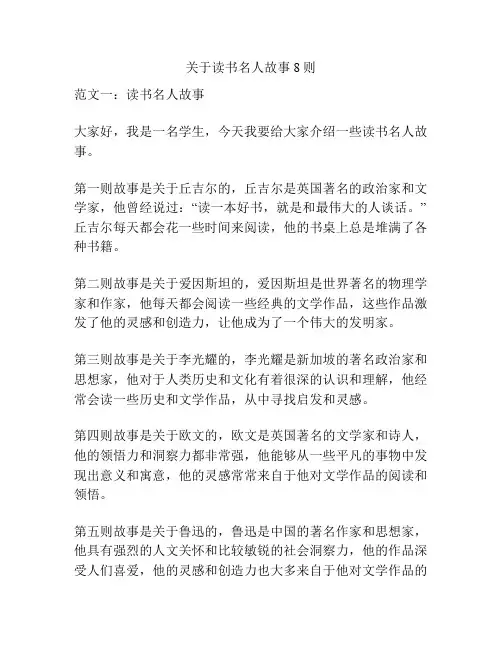
关于读书名人故事8则范文一:读书名人故事大家好,我是一名学生,今天我要给大家介绍一些读书名人故事。
第一则故事是关于丘吉尔的,丘吉尔是英国著名的政治家和文学家,他曾经说过:“读一本好书,就是和最伟大的人谈话。
”丘吉尔每天都会花一些时间来阅读,他的书桌上总是堆满了各种书籍。
第二则故事是关于爱因斯坦的,爱因斯坦是世界著名的物理学家和作家,他每天都会阅读一些经典的文学作品,这些作品激发了他的灵感和创造力,让他成为了一个伟大的发明家。
第三则故事是关于李光耀的,李光耀是新加坡的著名政治家和思想家,他对于人类历史和文化有着很深的认识和理解,他经常会读一些历史和文学作品,从中寻找启发和灵感。
第四则故事是关于欧文的,欧文是英国著名的文学家和诗人,他的领悟力和洞察力都非常强,他能够从一些平凡的事物中发现出意义和寓意,他的灵感常常来自于他对文学作品的阅读和领悟。
第五则故事是关于鲁迅的,鲁迅是中国的著名作家和思想家,他具有强烈的人文关怀和比较敏锐的社会洞察力,他的作品深受人们喜爱,他的灵感和创造力也大多来自于他对文学作品的阅读和理解。
第六则故事是关于泰戈尔的,泰戈尔是印度的著名诗人和思想家,他的作品含蓄而深刻,寓意丰富而意象生动,他的灵感和创造力都来自于他以及他的父亲对文学、音乐和艺术的热爱和追求。
第七则故事是关于契诃夫的,契诃夫是俄国著名的作家和剧作家,他的作品生动而有趣,同时也充满了深刻的人文关怀和思考,他的灵感和创造力都来自于他对文学作品的阅读和思考。
第八则故事是关于陶渊明的,陶渊明是中国著名的文学家和诗人,他的作品清新而自然,富有人文关怀和深刻的思考,他的灵感和创造力都来自于他对文学作品的阅读和思考。
这些读书名人故事给我们展示了一个事实,那就是阅读和书籍对于一个人的发展和成长非常重要,他们通过阅读,增强了自己的灵感和思维能力,提高了自己的文化修养和思辨能力,这也是我们应该向这些名人学习的例子。
写作重点分析:总论述:介绍读书名人故事,突出他们的阅读习惯主题句1:丘吉尔的阅读习惯和名言主题句2:爱因斯坦的阅读习惯和对创造力的影响主题句3:李光耀的阅读习惯和人文关怀主题句4:欧文的阅读习惯和领悟力主题句5:鲁迅的阅读习惯和作品主题句6:泰戈尔的阅读习惯和爱好主题句7:契诃夫的阅读习惯和作品主题句8:陶渊明的阅读习惯和作品用词分析:丰富:富有生气,充满生动的情感领悟力:对事物理解领悟的能力人文关怀:注重传统人文价值观和对人类情感生活的关注深刻:具有深度感知或思考的能力寓意丰富:作品在托物言志的同时,进一步富含着深远的生活哲理逍遥自在:自由从容,没有束缚和牵累洞察力: 发现事物本质的能力发展成长: 推向新的层面,情境和自我。
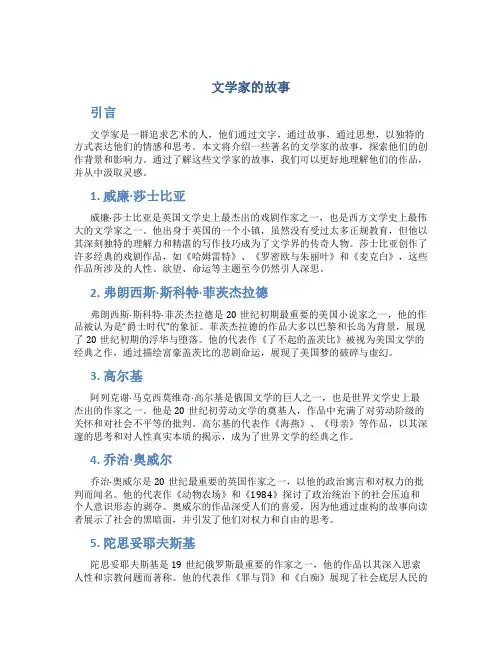
文学家的故事引言文学家是一群追求艺术的人,他们通过文字,通过故事,通过思想,以独特的方式表达他们的情感和思考。
本文将介绍一些著名的文学家的故事,探索他们的创作背景和影响力。
通过了解这些文学家的故事,我们可以更好地理解他们的作品,并从中汲取灵感。
1. 威廉·莎士比亚威廉·莎士比亚是英国文学史上最杰出的戏剧作家之一,也是西方文学史上最伟大的文学家之一。
他出身于英国的一个小镇,虽然没有受过太多正规教育,但他以其深刻独特的理解力和精湛的写作技巧成为了文学界的传奇人物。
莎士比亚创作了许多经典的戏剧作品,如《哈姆雷特》、《罗密欧与朱丽叶》和《麦克白》,这些作品所涉及的人性、欲望、命运等主题至今仍然引人深思。
2. 弗朗西斯·斯科特·菲茨杰拉德弗朗西斯·斯科特·菲茨杰拉德是20世纪初期最重要的美国小说家之一,他的作品被认为是“爵士时代”的象征。
菲茨杰拉德的作品大多以巴黎和长岛为背景,展现了20世纪初期的浮华与堕落。
他的代表作《了不起的盖茨比》被视为美国文学的经典之作,通过描绘富豪盖茨比的悲剧命运,展现了美国梦的破碎与虚幻。
3. 高尔基阿列克谢·马克西莫维奇·高尔基是俄国文学的巨人之一,也是世界文学史上最杰出的作家之一。
他是20世纪初劳动文学的奠基人,作品中充满了对劳动阶级的关怀和对社会不平等的批判。
高尔基的代表作《海燕》、《母亲》等作品,以其深邃的思考和对人性真实本质的揭示,成为了世界文学的经典之作。
4. 乔治·奥威尔乔治·奥威尔是20世纪最重要的英国作家之一,以他的政治寓言和对权力的批判而闻名。
他的代表作《动物农场》和《1984》探讨了政治统治下的社会压迫和个人意识形态的剥夺。
奥威尔的作品深受人们的喜爱,因为他通过虚构的故事向读者展示了社会的黑暗面,并引发了他们对权力和自由的思考。
5. 陀思妥耶夫斯基陀思妥耶夫斯基是19世纪俄罗斯最重要的作家之一,他的作品以其深入思索人性和宗教问题而著称。
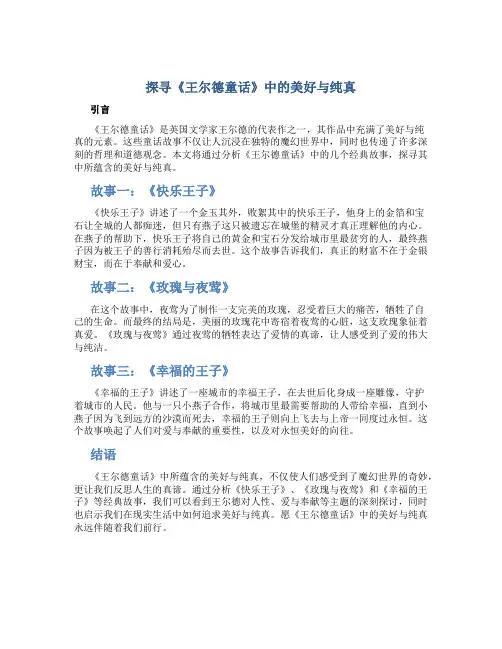
探寻《王尔德童话》中的美好与纯真引言《王尔德童话》是英国文学家王尔德的代表作之一,其作品中充满了美好与纯真的元素。
这些童话故事不仅让人沉浸在独特的魔幻世界中,同时也传递了许多深刻的哲理和道德观念。
本文将通过分析《王尔德童话》中的几个经典故事,探寻其中所蕴含的美好与纯真。
故事一:《快乐王子》《快乐王子》讲述了一个金玉其外,败絮其中的快乐王子,他身上的金箔和宝石让全城的人都痴迷,但只有燕子这只被遗忘在城堡的精灵才真正理解他的内心。
在燕子的帮助下,快乐王子将自己的黄金和宝石分发给城市里最贫穷的人,最终燕子因为被王子的善行消耗殆尽而去世。
这个故事告诉我们,真正的财富不在于金银财宝,而在于奉献和爱心。
故事二:《玫瑰与夜莺》在这个故事中,夜莺为了制作一支完美的玫瑰,忍受着巨大的痛苦,牺牲了自己的生命。
而最终的结局是,美丽的玫瑰花中寄宿着夜莺的心脏,这支玫瑰象征着真爱。
《玫瑰与夜莺》通过夜莺的牺牲表达了爱情的真谛,让人感受到了爱的伟大与纯洁。
故事三:《幸福的王子》《幸福的王子》讲述了一座城市的幸福王子,在去世后化身成一座雕像,守护着城市的人民。
他与一只小燕子合作,将城市里最需要帮助的人带给幸福,直到小燕子因为飞到远方的沙漠而死去,幸福的王子则向上飞去与上帝一同度过永恒。
这个故事唤起了人们对爱与奉献的重要性,以及对永恒美好的向往。
结语《王尔德童话》中所蕴含的美好与纯真,不仅使人们感受到了魔幻世界的奇妙,更让我们反思人生的真谛。
通过分析《快乐王子》、《玫瑰与夜莺》和《幸福的王子》等经典故事,我们可以看到王尔德对人性、爱与奉献等主题的深刻探讨,同时也启示我们在现实生活中如何追求美好与纯真。
愿《王尔德童话》中的美好与纯真永远伴随着我们前行。
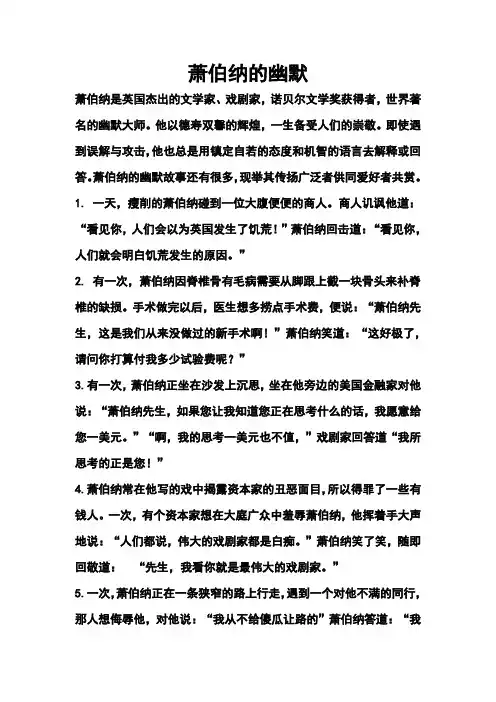
萧伯纳的幽默萧伯纳是英国杰出的文学家、戏剧家,诺贝尔文学奖获得者,世界著名的幽默大师。
他以德寿双馨的辉煌,一生备受人们的崇敬。
即使遇到误解与攻击,他也总是用镇定自若的态度和机智的语言去解释或回答。
萧伯纳的幽默故事还有很多,现举其传扬广泛者供同爱好者共赏。
1. 一天,瘦削的萧伯纳碰到一位大腹便便的商人。
商人讥讽他道:“看见你,人们会以为英国发生了饥荒!”萧伯纳回击道:“看见你,人们就会明白饥荒发生的原因。
”2. 有一次,萧伯纳因脊椎骨有毛病需要从脚跟上截一块骨头来补脊椎的缺损。
手术做完以后,医生想多捞点手术费,便说:“萧伯纳先生,这是我们从来没做过的新手术啊!”萧伯纳笑道:“这好极了,请问你打算付我多少试验费呢?”3.有一次,萧伯纳正坐在沙发上沉思,坐在他旁边的美国金融家对他说:“萧伯纳先生,如果您让我知道您正在思考什么的话,我愿意给您一美元。
”“啊,我的思考一美元也不值,”戏剧家回答道“我所思考的正是您!”4.萧伯纳常在他写的戏中揭露资本家的丑恶面目,所以得罪了一些有钱人。
一次,有个资本家想在大庭广众中羞辱萧伯纳,他挥着手大声地说:“人们都说,伟大的戏剧家都是白痴。
”萧伯纳笑了笑,随即回敬道:“先生,我看你就是最伟大的戏剧家。
”5.一次,萧伯纳正在一条狭窄的路上行走,遇到一个对他不满的同行,那人想侮辱他,对他说:“我从不给傻瓜让路的”萧伯纳答道:“我正好相反”。
6.萧伯纳送给朋友一部新作,后来他在一家旧书铺发现了这部赠书,于是当即就把它买回来,重新送给那位朋友。
朋友收到这部书时,见扉页上又写了几个字:“萧伯纳再赠。
”7.大作家萧伯纳年轻的时候,便名声大噪了。
美国著名舞蹈家邓肯有一次写信给他,说:“假如我们两个结婚,生下的孩子头脑像你,面孔像我,该有多好哟。
”萧伯纳接到信,笑了笑,一本正经地给她回了一封信,其中一段是这样写的:“要是生的孩子,头脑像你,而面孔像我,那岂不是糟透了!”8.有一次,一个皮鞋油制造厂的老板要求萧伯纳允许该厂用他的名字作为一种新品种的皮鞋油的商标。
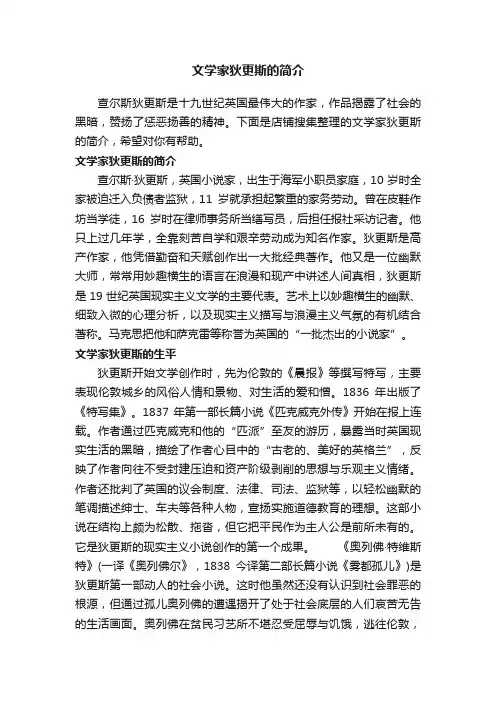
文学家狄更斯的简介查尔斯狄更斯是十九世纪英国最伟大的作家,作品揭露了社会的黑暗,赞扬了惩恶扬善的精神。
下面是店铺搜集整理的文学家狄更斯的简介,希望对你有帮助。
文学家狄更斯的简介查尔斯·狄更斯,英国小说家,出生于海军小职员家庭,10岁时全家被迫迁入负债者监狱,11岁就承担起繁重的家务劳动。
曾在皮鞋作坊当学徒,16岁时在律师事务所当缮写员,后担任报社采访记者。
他只上过几年学,全靠刻苦自学和艰辛劳动成为知名作家。
狄更斯是高产作家,他凭借勤奋和天赋创作出一大批经典著作。
他又是一位幽默大师,常常用妙趣横生的语言在浪漫和现产中讲述人间真相,狄更斯是19世纪英国现实主义文学的主要代表。
艺术上以妙趣横生的幽默、细致入微的心理分析,以及现实主义描写与浪漫主义气氛的有机结合著称。
马克思把他和萨克雷等称誉为英国的“一批杰出的小说家”。
文学家狄更斯的生平狄更斯开始文学创作时,先为伦敦的《晨报》等撰写特写,主要表现伦敦城乡的风俗人情和景物、对生活的爱和憎。
1836年出版了《特写集》。
1837年第一部长篇小说《匹克威克外传》开始在报上连载。
作者通过匹克威克和他的“匹派”至友的游历,暴露当时英国现实生活的黑暗,描绘了作者心目中的“古老的、美好的英格兰”,反映了作者向往不受封建压迫和资产阶级剥削的思想与乐观主义情绪。
作者还批判了英国的议会制度、法律、司法、监狱等,以轻松幽默的笔调描述绅士、车夫等各种人物,宣扬实施道德教育的理想。
这部小说在结构上颇为松散、拖沓,但它把平民作为主人公是前所未有的。
它是狄更斯的现实主义小说创作的第一个成果。
《奥列佛·特维斯特》(一译《奥列佛尔》,1838今译第二部长篇小说《雾都孤儿》)是狄更斯第一部动人的社会小说。
这时他虽然还没有认识到社会罪恶的根源,但通过孤儿奥列佛的遭遇揭开了处于社会底层的人们哀苦无告的生活画面。
奥列佛在贫民习艺所不堪忍受屈辱与饥饿,逃往伦敦,反又陷入贼窟,最后被“有德行的”资本家挽救出来。
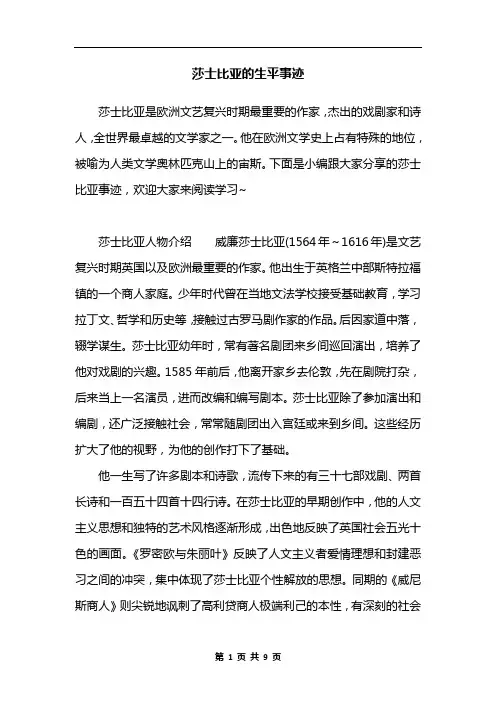
莎士比亚的生平事迹莎士比亚是欧洲文艺复兴时期最重要的作家,杰出的戏剧家和诗人,全世界最卓越的文学家之一。
他在欧洲文学史上占有特殊的地位,被喻为人类文学奥林匹克山上的宙斯。
下面是小编跟大家分享的莎士比亚事迹,欢迎大家来阅读学习~莎士比亚人物介绍威廉莎士比亚(1564年~1616年)是文艺复兴时期英国以及欧洲最重要的作家。
他出生于英格兰中部斯特拉福镇的一个商人家庭。
少年时代曾在当地文法学校接受基础教育,学习拉丁文、哲学和历史等,接触过古罗马剧作家的作品。
后因家道中落,辍学谋生。
莎士比亚幼年时,常有著名剧团来乡间巡回演出,培养了他对戏剧的兴趣。
1585年前后,他离开家乡去伦敦,先在剧院打杂,后来当上一名演员,进而改编和编写剧本。
莎士比亚除了参加演出和编剧,还广泛接触社会,常常随剧团出入宫廷或来到乡间。
这些经历扩大了他的视野,为他的创作打下了基础。
他一生写了许多剧本和诗歌,流传下来的有三十七部戏剧、两首长诗和一百五十四首十四行诗。
在莎士比亚的早期创作中,他的人文主义思想和独特的艺术风格逐渐形成,出色地反映了英国社会五光十色的画面。
《罗密欧与朱丽叶》反映了人文主义者爱情理想和封建恶习之间的冲突,集中体现了莎士比亚个性解放的思想。
同期的《威尼斯商人》则尖锐地讽刺了高利贷商人极端利己的本性,有深刻的社会意义。
莎士比亚创作高峰的标志是四大悲剧:《哈姆雷特》、《奥赛罗》、《李尔王》和《麦克白》。
其中《哈姆雷特》堪称世界最佳悲剧,主人公哈姆雷特也成了最复杂的文学典型之一。
莎士比亚晚年转入神奇剧的创作,寄希望于乌托邦式的理想世界,作品有《辛白林》、《暴风雨》等。
莎士比亚戏剧的艺术特色主要在情节的生动性与丰富性的完美结合,人物形象具有高度的典型性,同时又有丰富多彩的个性特征。
作品思想通过情节人物自然地表现出来。
莎士比亚还是语言的大师,他吸收人民的语言、以及古代和当代的文学语言,运用得得心应手。
剧中时用散文,时用诗体,毫不刻板。
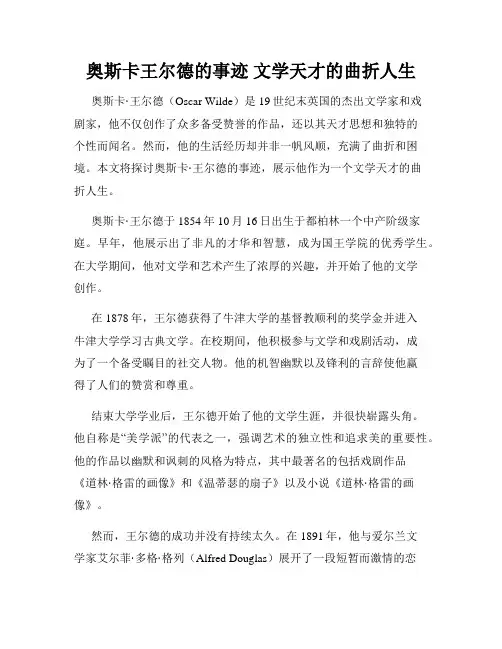
奥斯卡王尔德的事迹文学天才的曲折人生奥斯卡·王尔德(Oscar Wilde)是19世纪末英国的杰出文学家和戏剧家,他不仅创作了众多备受赞誉的作品,还以其天才思想和独特的个性而闻名。
然而,他的生活经历却并非一帆风顺,充满了曲折和困境。
本文将探讨奥斯卡·王尔德的事迹,展示他作为一个文学天才的曲折人生。
奥斯卡·王尔德于1854年10月16日出生于都柏林一个中产阶级家庭。
早年,他展示出了非凡的才华和智慧,成为国王学院的优秀学生。
在大学期间,他对文学和艺术产生了浓厚的兴趣,并开始了他的文学创作。
在1878年,王尔德获得了牛津大学的基督教顺利的奖学金并进入牛津大学学习古典文学。
在校期间,他积极参与文学和戏剧活动,成为了一个备受瞩目的社交人物。
他的机智幽默以及锋利的言辞使他赢得了人们的赞赏和尊重。
结束大学学业后,王尔德开始了他的文学生涯,并很快崭露头角。
他自称是“美学派”的代表之一,强调艺术的独立性和追求美的重要性。
他的作品以幽默和讽刺的风格为特点,其中最著名的包括戏剧作品《道林·格雷的画像》和《温蒂瑟的扇子》以及小说《道林·格雷的画像》。
然而,王尔德的成功并没有持续太久。
在1891年,他与爱尔兰文学家艾尔菲·多格·格列(Alfred Douglas)展开了一段短暂而激情的恋情,引起了社会的强烈谴责。
这段恋情不仅导致了他个人生活的混乱,还给他的事业带来了巨大的打击。
王尔德与多格·格列的恋情最终被曝光,引发了一场轰动的丑闻。
他被控涉嫌同性恋,这当时被法律视为严重的犯罪行为。
在1895年,王尔德因“猥亵罪”被判入狱两年,并被剥夺了个人自由。
在狱中度过的日子里,他经历了巨大的痛苦和困境,但他从未放弃对艺术的信仰和追求。
在他的囚禁期间,王尔德写下了《彷徨的影子》,这是关于自己囚禁经历的纪实文学作品。
他讲述了自己在狱中的艰难处境和面对的种种苦痛,同时也表达了对人性和社会的深刻思考。
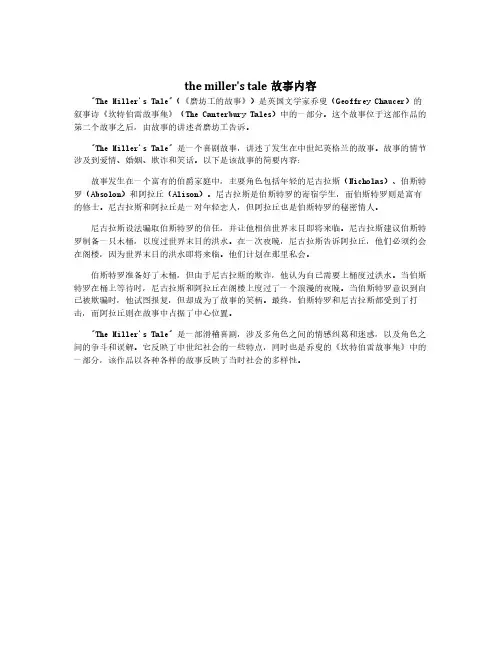
the miller's tale故事内容"The Miller's Tale"(《磨坊工的故事》)是英国文学家乔叟(Geoffrey Chaucer)的叙事诗《坎特伯雷故事集》(The Canterbury Tales)中的一部分。
这个故事位于这部作品的第二个故事之后,由故事的讲述者磨坊工告诉。
"The Miller's Tale"是一个喜剧故事,讲述了发生在中世纪英格兰的故事。
故事的情节涉及到爱情、婚姻、欺诈和笑话。
以下是该故事的简要内容:故事发生在一个富有的伯爵家庭中,主要角色包括年轻的尼古拉斯(Nicholas)、伯斯特罗(Absolon)和阿拉丘(Alison)。
尼古拉斯是伯斯特罗的寄宿学生,而伯斯特罗则是富有的修士。
尼古拉斯和阿拉丘是一对年轻恋人,但阿拉丘也是伯斯特罗的秘密情人。
尼古拉斯设法骗取伯斯特罗的信任,并让他相信世界末日即将来临。
尼古拉斯建议伯斯特罗制备一只木桶,以度过世界末日的洪水。
在一次夜晚,尼古拉斯告诉阿拉丘,他们必须约会在阁楼,因为世界末日的洪水即将来临。
他们计划在那里私会。
伯斯特罗准备好了木桶,但由于尼古拉斯的欺诈,他认为自己需要上桶度过洪水。
当伯斯特罗在桶上等待时,尼古拉斯和阿拉丘在阁楼上度过了一个浪漫的夜晚。
当伯斯特罗意识到自己被欺骗时,他试图报复,但却成为了故事的笑柄。
最终,伯斯特罗和尼古拉斯都受到了打击,而阿拉丘则在故事中占据了中心位置。
"The Miller's Tale"是一部滑稽喜剧,涉及多角色之间的情感纠葛和迷惑,以及角色之间的争斗和误解。
它反映了中世纪社会的一些特点,同时也是乔叟的《坎特伯雷故事集》中的一部分,该作品以各种各样的故事反映了当时社会的多样性。
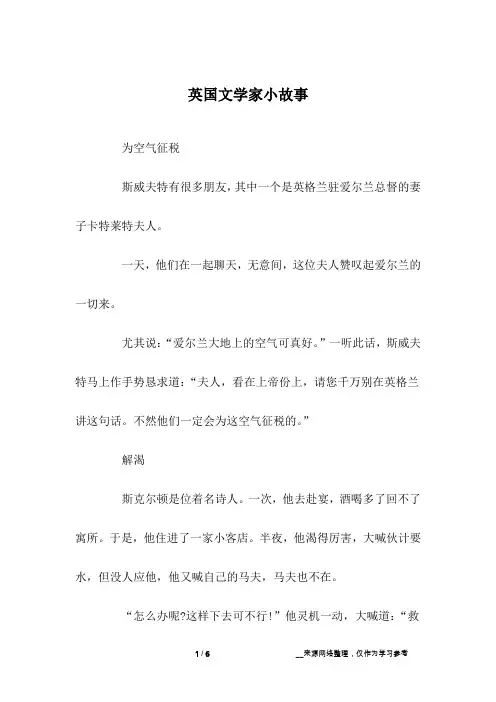
英国文学家小故事为空气征税斯威夫特有很多朋友,其中一个是英格兰驻爱尔兰总督的妻子卡特莱特夫人。
一天,他们在一起聊天,无意间,这位夫人赞叹起爱尔兰的一切来。
尤其说:“爱尔兰大地上的空气可真好。
”一听此话,斯威夫特马上作手势恳求道:“夫人,看在上帝份上,请您千万别在英格兰讲这句话。
不然他们一定会为这空气征税的。
”解渴斯克尔顿是位着名诗人。
一次,他去赴宴,酒喝多了回不了寓所。
于是,他住进了一家小客店。
半夜,他渴得厉害,大喊伙计要水,但没人应他,他又喊自己的马夫,马夫也不在。
“怎么办呢?这样下去可不行!”他灵机一动,大喊道:“救火啊!救火啊!”顿时,全店乱成一团,所有的人都起来了。
他继续喊叫,不一会儿马夫和伙计便拿着蜡烛冲了进来:“火在哪里,怎么看不到呢?”“在这,”斯克尔顿指着自己的喉咙,“火在这里面,快给我端水来,浇灭它!”变味的鸡蛋《福尔摩斯探案集》的作者阿瑟·柯南道尔(1859--1930年),曾当过杂志编辑,每天要处理大量退稿。
一天,他收到一封信,信上说:“您退回我的小说,但我知道您并没有把小说读完,因为我故意把几面稿纸粘在一起,您并没有把它们拆开,您这样做是很不好的。
”柯南道尔回信说:“如果您用早餐时盘子里放着一只坏鸡蛋,您大可不必把它吃完才能证明这只鸡蛋变味了。
”和福尔摩斯不相上下有一次,英国作家柯南道尔在巴黎叫了一辆出租马车。
他先把旅行包扔进了车里,然后爬了上去,但还没有等他开口,赶车人就说:“柯南道尔先生,您上哪儿去?”“你认识我?”作家有点诧异地问。
“不,从来没有见过。
”“那么你怎么知道我是柯南道尔呢?”“这个,”赶车人说,“我在报纸上看到你在法国南部度假的消息,看到你是从马赛开来的一列火车上下来,我注意到你的皮肤膨胀黝黑。
这说明你在阳光充足的地方至少呆了一个多星期,又从你右手指上的墨水渍来推断,你肯定是一个作家;另外你还具有外科医生那种敏锐的目光并穿着英国式样的服装。
我认为你肯定就是柯南道尔!”柯南道尔大吃一惊:“既然你能从所有这些细微的观察中认出我来,那么你自己和福尔摩斯也不相上下了。
傲慢与偏见故事梗概《傲慢与偏见》是英国文学家简·奥斯汀的代表作,也是世界文学史上最杰出的爱情小说之一。
小说以19世纪英国乡绅社会为背景,以女主人公伊丽莎白·班内特与达西先生的爱情故事为主线,展现了傲慢与偏见在人际关系中所带来的种种误会和矛盾,以及人性的复杂和多变。
故事发生在英国乡村,班内特家有五个女儿,由于家境拮据,她们需要找到好的姻缘来解决经济问题。
伊丽莎白是班内特家的二女儿,她聪明美丽,性格独立,却与姐姐的浪漫和妈妈的务实形成鲜明对比。
她不愿意为了金钱而嫁给一个她不爱的人。
在一次舞会上,她遇到了达西先生,一个富有但傲慢自大的绅士。
达西对伊丽莎白产生了好感,但因为她的家庭地位低下,他的朋友们都不看好他们的配对。
在与达西先生的交往中,伊丽莎白对他的傲慢和自大感到愤怒,并且被误导认为他阻止了她姐姐的婚事。
同时,她又被另一个叫做韦斯利的军官追求,而韦斯利的出现又让达西感到嫉妒。
在一系列的误会和矛盾中,两人的感情愈发复杂。
最终,通过一系列的事件和对彼此性格的重新认识,伊丽莎白和达西克服了彼此之间的傲慢和偏见,最终走到了一起。
同时,她的姐姐也成功地嫁给了韦斯利。
整个故事以婚礼为结尾,展现了爱情的美好和幸福。
《傲慢与偏见》通过描绘19世纪英国乡绅社会的风貌,展现了人性中的傲慢与偏见在人际关系中所带来的误会和矛盾。
小说以其细腻的描写和深刻的人物刻画,成为了世界文学史上不可或缺的经典之作。
这部小说不仅仅是一部爱情小说,更是对当时社会风貌和人性的深刻观察和揭示。
通过伊丽莎白和达西的爱情故事,读者也能够从中获得启发和感悟,学会如何克服傲慢与偏见,真正理解和珍惜爱情的真谛。
文学家狄更斯的故事狄更斯是十九世纪英国最伟大的小说家,为批判现实主义的文学做出了卓越贡献。
下面是搜集整理的文学家狄更斯的故事,希望对你有帮助。
民间一直流传着一则狄更斯钓鱼的故事。
每次写作完之后,狄更斯都会选择放松一下自己,常常坐到绿荫下垂钓。
每一次钓鱼都能够激发狄更斯创作的灵感。
一次,狄更斯拿着钓鱼工具到老地方钓鱼。
绿波荡漾,狄更斯眼睛一眨也不眨地盯着水命。
浮子一沉,狄更斯满心欢喜地将拉起,可是那鱼精明地很,已经遛走了。
狄更斯全身心地专注于钓鱼,突然,一个陌生人闪进了他的视线。
陌生人奇怪地对狄更斯瞅了一眼,询问他是不是在那儿钓鱼。
狄更斯注视着水面的浮标回答道,自己一直在那儿钓鱼。
今天钓了一上午也没有一条上钩。
可是昨天也是在同一地点,他一下子钓了十来条。
说完,狄更斯得意地摸了摸下巴。
陌生人向狄更斯确认他说的话是否属实。
狄更斯想也不想地肯定了他自己说的话。
谁知这时的陌生人换了一付嘴脸,嗓音变高向狄更斯喊道,这条河禁止钓鱼,他真是专门检查钓鱼的人员。
话刚说完,陌生人就从袋子里掏出了一本发票簿,看样子是想要开罚单。
狄更斯很吃惊,但一会儿后他慢悠悠地向陌生人询问知不知道他是谁。
陌生人听到狄更斯的话一愣。
狄更斯见状立刻发笑说,自己是狄更斯,写小说的作家,他不能罚他的款,因为编造故事成为了他的习惯。
狄更斯巧妙地否定了原先讲的话,将在那地钓鱼说成是自己编造的故事。
狄更斯最终逃脱了罚款。
狄更斯的爱情生活狄更斯的婚姻过得并不幸福。
二十四岁时,狄更斯发表了匹克外传。
春风得意之时,狄更斯结婚了。
新娘是狄更斯在报社中的同事,同事也是他顶头上司的女儿,她叫凯瑟琳。
凯瑟琳有一双蔚蓝的大眼睛,容貌美丽,颇得男子喜欢。
但是凯瑟琳不怎么活泼。
婚后的生活让狄更斯身上有了更多的责任。
双方家庭的生活重担都压在狄更斯身上。
为此,狄更斯更加勤奋地写作,陆续发表了多篇小说。
1842年,狄更斯夫妇开始了为期半年的旅行,一起踏遍了美国的各大城市。
歌德和席勒-长眠在一起的文学家-德育名人小故事歌德和席勒-长眠在一起的文学家-德育名人小故事
歌德二十几岁成名,三十岁出头就当了国务大臣,一生过着贵族生活。
比他小十岁的席勒,一生坎坷。
虽然席勒在二-卜多岁也蜚声文坛,但穷困与疾病一直伴随着他。
尽管如此,歌德与席勒却保持着真诚的友谊。
席勒的友谊和勤奋使歌德从富贵享乐中惊起,又拿起笔来写作,包括《浮土德》在内的许多名作的问世,都与席勒的影响分不开。
歌德满怀深情地向席勒说:"你给了我第二次青春,使我作为诗人复活了--我早巳不再是诗人。
"席勒也在朋友的鼓励下,抱病完成了最后一部伟大作品《威廉,退尔》。
这部作品的素材,都是歌德提供的。
他们一起出版过《女神》杂志,合办过文艺刊物《霍伦》,共同出版过诗集《克赛尼恩》。
他们常常是一个人沟思,起草,另一个人修改润色,然后发表。
互助的力量,使他们的文艺作品进发出夺自的光辉。
席勒病故后,歌德悲痛万分,他说:"如今我失去了明友,所以我的存在也
丧失了一半"。
二十七年后,歌德也完成了尘世的历程,安然长睡在席勒身边。
著名文学家的故事范文7篇著名文学家的故事(篇1)巴尔扎克小时候很爱好文学,父亲却硬要他学习法律.他就是不服从父亲的旨意,父子之间常为此事发生冲突。
一天,父亲再也按捺不住气愤,质问巴尔扎克:“我让你学习法律,你为什么要学习文学?”“爸爸,您知道,我对法律是毫无兴趣的.”巴尔扎克非常亲切地对父亲说。
“毫无兴趣!”父亲暴怒地快要跳起来,”你有兴趣的是什么?是文学!搞文学谈何容易,我看你根本不是搞文学的料!”“那不一定!”巴尔扎克摇摇头,非常自信地说,”一个人的成功,往往取决於他的信心和努力。
”“信心和努力?那好,从今天起,给你两年的期限,搞不成,就得学习法律,你敢答应吗?”“敢!”巴尔扎克斩钉截铁地回答。
从此,巴尔扎克被父亲关在房子里,整天埋头写作。
这期间,他写了一个历史剧,由於自己的阅历有限,对剧本的特点了解不够,没有成功.但巴尔扎克并没有丧失信心,他坚信,只要有决心、肯努力,一定能在文学上取得成绩。
一段时间的写作实践,使巴尔扎克感到自己的知识和经验都很浅薄.於是,他拼命阅读世界文学名著,广泛地接触社会和了解人生.他天天出入於图书馆和书店,总是来得最早,离开最晚.有一次,他在图书馆里翻阅资料,边看边记,忘记了时间的早晚.图书馆的人员下班了,也忘记招呼巴尔扎克一声.第二天早晨,图书馆的人员来上班了,发现巴尔扎克还在边看边记.为了读书,巴尔扎克真到了废寝忘食的地步。
巴尔扎克在一部小说中需一打架斗殴的情节,就到街上去观察.好容易遇到两个青年人争执,他就故意从中煽风点火,想让两个人打起来.谁知两人看穿了他的“诡计”,合起来把他轰走了.巴尔扎克写起*来就闭门谢客,甚至家里人也不让进他的书房。
有一次他把屋门锁了,从窗户跳进屋里,再的把窗紧闭上.来访的人见门上落了锁就自动回去了。
经过几年的努力,巴尔扎克出版了小说《朱安党》,赢得了法国文学界的一致赞扬.以后他又陆续完成了《人间喜剧》等97部小说,确立了他在法国文学史和世界文学史上的地位.著名文学家的故事(篇2)1819午,巴尔扎克中学毕业,进入大学学法律。
文学家名人故事:马克·吐温的幽默故事(一)马克·吐温喜欢借书。
邻居很小气,不想借给他,于是他想了个主意。
一天,马克·吐温又来借书,邻居便说:“好吧。
不过,我和妻子刚刚订了个规矩:从我这儿借去的书必须当场阅读。
”过了几天,邻居来向马克·吐温借割草机。
马克·吐温笑笑说:“当然可以。
不过我也订了个规矩:从我家借走的割草机必须在我家的草地上使用!”马克·吐温有一次坐火车去首都一所大学讲课,他十分着急,而火车却开得很慢。
这时来了一位查票员,问马克·吐温:“你有票吗?”马克·吐温递给他一张儿童票。
查票员仔细地打量了他之后说:“真有意思,我看不出您还是一个孩子啊!”马克·吐温回答:“现在我已经不是孩子了,但我买车票的时候还是孩子。
您要知道,火车开得太慢了。
”有一年的“愚人节”,纽约的一家报纸为了愚弄众人,报道了一则马克·吐温去世的消息。
于是,吊唁的人流纷纷向马克·吐温家涌来。
当人们看到出来的竟是马克·吐温本人时,又惊讶又气愤,纷纷谴责那家报纸对马克·吐温的这种大不敬行为。
马克·吐温却没有发火,而是幽默地说:“报纸报道我死是千真万确的,不过日期提前了一些。
”1————来源网络整理,仅供供参考马克·吐温来到法国旅游。
一天,他独自去理发店理发。
“先生,您像刚从外国来的?”“是的。
”“您真走运,因为马克·吐温先生也在这里,今晚您可以去听他演讲。
”“我不得不去。
”“先生,您有入场券吗?”“没有。
”“这太遗憾了!”理发师耸耸肩,“那您只好从头到尾站着听了,因为那里不会有空座位。
”“对!”幽默大师说,“和马克·吐温在一起可真糟糕,他一演讲我就得站着。
”马克?吐温有一天来到一个小城市,他想找一家旅馆过夜。
旅馆服务台上的职员请他将名字写到旅客登记簿上。
马克?吐温先看了一下登记簿,他发现很多旅客都是这样登记的,比如:拜特福公爵和他的仆人……这位着名的作家于是挥笔写道:“马克?吐温和他的箱子。
文学家名人故事:能预测别人的将来英国作家查理斯出身贫寒,他自幼酷爱文学,也写了不少文章,可惜一直只字未获发表。
一日,查理斯出去漫步,待他想记录下一天的心情时,才觉察包里的习作本丢了。
焦急的查理斯顺着原路往回找,突然发现一个老太太手里正拿着自己的本子,就连忙上前说:“这本子是我掉的,您能还给我吗?”“哦,是吗?里面都是什么呀?”查理斯不好意思地说:“都是我写的一些文章。
”老太太笑了,递还给他:“我方才看了,文章真的不错。
知道吗,我能预测别人的将来,你今后一定会是个作家。
”然而查理斯却并没有将这句话放在心上。
他知道,自己没有那个天赋;他也知道,对于贫困的父母来说,早日工作挣钱对他才是最重要的。
实验中学一毕业,他就四处寻找工作,当酒店招待,做推销员,干修理工。
令他沮丧的是,他总是运气不好,每次都因为一点小事被辞退。
后来,在亲戚的帮助下,他进了一家公司做文员,虽然薪金不高,但好歹还算体面。
可惜好景不长,公司又倒闭了。
日暮途穷的时候,查理斯突然想起老太太那句神秘的话,难道自己真的合适当一名作家?他暗自思忖。
最后,他下定决心开始构思小说。
创作过程十分艰苦,但他一想起老太太的话,就会增添无穷的动力。
终于,他以自己为原型,把这些年遇到的世态炎凉,把穷人的无奈和富人的空虚用一个个故事表现了出来。
小说一发表,立即受到众多读者的青睐。
成名后的查理斯找到老太太的后人,感激她当年的指
点迷津。
老太太的女儿瞪大了眼睛:“我的母亲根本不识字!”[文学家名人故事:能预测别人的将来]相关文章:。
英国文学家小故事
为空气征税
斯威夫特有很多朋友,其中一个是英格兰驻爱尔兰总督的妻子卡特莱特夫人。
一天,他们在一起聊天,无意间,这位夫人赞叹起爱尔兰的一切来。
尤其说:“爱尔兰大地上的空气可真好。
”一听此话,斯威夫特马上作手势恳求道:“夫人,看在上帝份上,请您千万别在英格兰讲这句话。
不然他们一定会为这空气征税的。
”
解渴
斯克尔顿是位着名诗人。
一次,他去赴宴,酒喝多了回不了寓所。
于是,他住进了一家小客店。
半夜,他渴得厉害,大喊伙计要水,但没人应他,他又喊自己的马夫,马夫也不在。
“怎么办呢?这样下去可不行!”他灵机一动,大喊道:“救火啊!
救火啊!”顿时,全店乱成一团,所有的人都起来了。
他继续喊叫,不一会儿马夫和伙计便拿着蜡烛冲了进来:“火在哪里,怎么看不到呢?”
“在这,”斯克尔顿指着自己的喉咙,“火在这里面,快给我端水来,浇灭它!”
变味的鸡蛋
《福尔摩斯探案集》的作者阿瑟·柯南道尔(1859--1930年),曾当过杂志编辑,每天要处理大量退稿。
一天,他收到一封信,信上说:“您退回我的小说,但我知道您并没有把小说读完,因为我故意把几面稿纸粘在一起,您并没有把它们拆开,您这样做是很不好的。
”
柯南道尔回信说:“如果您用早餐时盘子里放着一只坏鸡蛋,您大可不必把它吃完才能证明这只鸡蛋变味了。
”
和福尔摩斯不相上下
有一次,英国作家柯南道尔在巴黎叫了一辆出租马车。
他先把旅行包扔进了车里,然后爬了上去,但还没有等他开口,赶车人就说:“柯南道尔先生,您上哪儿去?”
“你认识我?”作家有点诧异地问。
“不,从来没有见过。
”
“那么你怎么知道我是柯南道尔呢?”
“这个,”赶车人说,“我在报纸上看到你在法国南部度假的消息,看到你是从马赛开来的一列火车上下来,我注意到你的皮肤膨胀黝黑。
这说明你在阳光充足的地方至少呆了一个多星期,又从你右手指上的墨水渍来推断,你肯定是一个作家;另外你还具有外科医生那种敏锐的目光并穿着英国式样的服装。
我认为你肯定就是柯南道尔!”
柯南道尔大吃一惊:“既然你能从所有这些细微的观察中认出我来,那么你自己和福尔摩斯也不相上下了。
”
“还有,”赶车人说,“还有一个小小的事实。
”
“什么事实?”
“旅行包上写有你的名字。
”
柯南道尔的威力
有一次,柯南道尔收到一封从巴西寄来的信,信中说:“有可
能的话,我很希望得到一张您亲笔签名的您的照片,我将把它放在我的房内。
这样,不仅仅我能每天看见您,我坚信,若有贼进来,一看到您的照片,肯定会吓得跑掉。
”
别出心裁的广告
英国着名小说家毛姆(1874--1965年)成名之前,生活非常贫困。
虽然写了一部很有价值的书稿,但出版后无人问津。
为了引起人们的注意,毛姆别出心裁地在各大报刊上登了如下的征婚启事:
“本人喜欢音乐和运动,是个年轻又有教养的百万富翁,希望能和毛姆小说中的主角完全一样的女性结婚。
”
几天之后,全伦敦的书店,都再也买不到毛姆的书了。
虚构的钩鱼故事
一天,英国作家狄更斯(1812--1870年)坐在江边垂钓,一个陌生人走到他的面前问他:“怎么,您在钓鱼?”
“是啊,”狄更斯随口回答,“今天运气真槽,这时候了,还不见
一条呢。
可是昨天也是在这里,我钧了15条呢!”
“是这样吗?”那人说,“可是您知道我是谁吗?我是专门管这段江面的,这儿禁止钓鱼!”说着,他从口袋里掏出发票本,要记名罚款。
狄更斯连忙反问:“您知道我是谁吗?我是专门负责虚构故事的,虚构故事是作家的事业,所以,不能罚我的款!”
“医嘱”
写《名利场》的英国着名作家萨克雷(1811--1863年)一生助人为乐,做好事从来不留名。
当他知道朋友有困难时,便常常用别名、假名甚至不具名汇款,给人以接济。
寄钱时,他把钱装在用过的药品盒里,并附有一份“医瞩”,上面写明“服法”:
“每次服一粒,急时‘服用’”!
请求赦兔的理由
约翰·德纳姆(1615--1669年)和清教徒乔治·威瑟是英国17世纪文坛上的诗友,威瑟后来因为反对君主制被监禁在马绍尔海,并
被�幸运佬獭t己�·德纳姆虽然是拥护国王的,但还是成功地为他的朋友向查理一世求了情,使他兔遭杀戮,他的理由是:“如果陛下杀死乔治·威瑟,那我就要成为英国最糟糕的诗人了。
”。